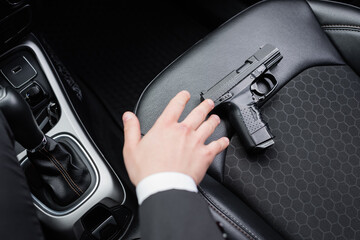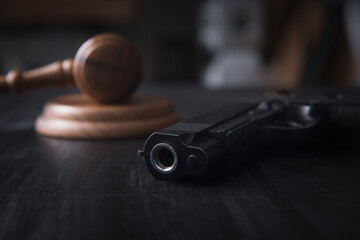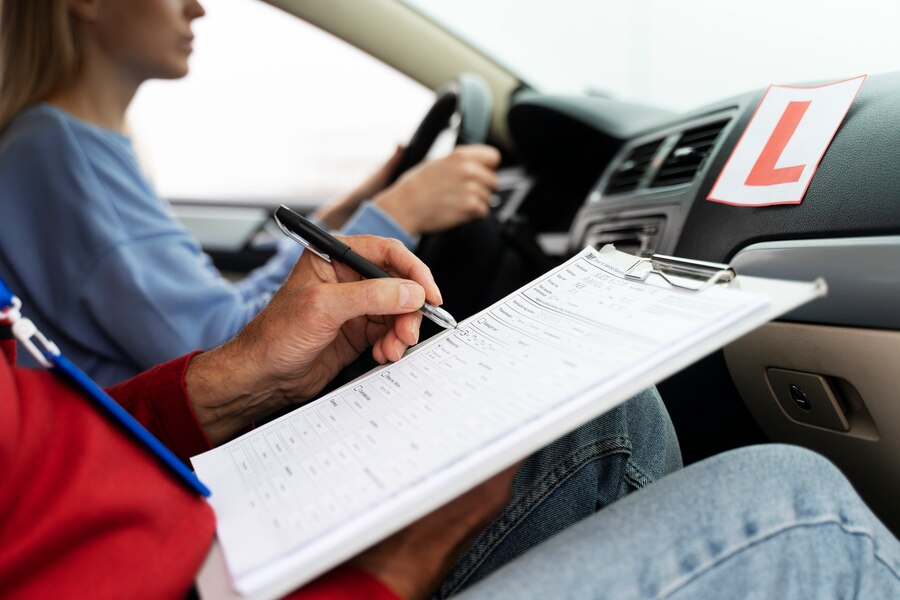In Michigan, the legal landscape surrounding firearms is governed by a set of clear regulations. Among the many topics of interest to gun owners, one that frequently arises is the legality and safety considerations of leaving a gun in a car. This article aims to provide a detailed analysis of Michigan’s gun laws with a focus on this particular aspect, ensuring that firearm owners are well-informed about how to responsibly handle their weapons when they are not actively carrying them.
Legal Requirements for Leaving a Gun in a Car
If you are a CPL holder in Michigan, there are specific rules you must follow when leaving your firearm in your vehicle. These laws are intended to prevent theft and unauthorized use of the firearm. Here are the key points:
Secure Storage
Proper storage of firearms in a vehicle is a legal requirement aimed at enhancing safety and preventing unauthorized access. Michigan law specifies the following options for secure storage:
| Storage Option | Description |
| Trunk | The trunk of the vehicle provides a secure and enclosed space suitable for storing firearms. Placing the firearm in the trunk ensures that it is out of sight and inaccessible to unauthorized individuals. |
| Locked Glove Box | Many vehicles come equipped with a locking glove box, which serves as another secure storage location for firearms. Keeping the firearm in a locked glove box adds an extra layer of protection against theft or misuse. |
| Firearm Storage Box | Alternatively, individuals may choose to use a dedicated firearm storage box that is securely mounted within the vehicle. These boxes are specifically designed to safely store firearms and prevent unauthorized access. |
Concealment
Concealing the firearm from view outside the vehicle is another important aspect of compliance with Michigan’s firearm laws. Concealment helps maintain a low profile and reduces the risk of theft or misuse. Here are some key considerations regarding concealment:
- Visible firearms can attract attention and may invite theft or unauthorized access. Concealing the firearm ensures that it remains unnoticed by passersby and potential intruders.
- Concealment can be achieved by placing the firearm in a location within the vehicle where it is not visible from outside. This could include storing it in the trunk, a locked glove box, or a dedicated firearm storage box.
- It’s essential to ensure that no part of the firearm is visible through the windows or from outside the vehicle. Covering the firearm with a jacket, bag, or other items can help maintain concealment.
CPL Holder Status
Michigan law restricts the privilege of leaving a concealed pistol in a locked vehicle to individuals with a valid Concealed Pistol License (CPL). CPL holders have undergone background checks and firearm safety training, demonstrating their eligibility and responsibility to possess firearms. Here are key points regarding CPL holder status:
- CPL holders are legally permitted to carry concealed pistols and may leave them in a locked vehicle for security purposes.
- The CPL indicates that the individual has met the necessary requirements and is authorized to carry a concealed firearm in accordance with Michigan law.
- Non-CPL holders are not permitted to leave firearms in their vehicles unless they are unloaded and properly stored in compliance with state and federal regulations.
Impact on Public Safety
Proper storage of firearms in vehicles is critical for public safety. By securing firearms, CPL holders help prevent:
Theft Prevention
One of the primary concerns associated with leaving firearms in vehicles is the potential for theft. Unsecured guns are attractive targets for thieves, particularly when left in vehicles. The following factors highlight the significance of theft prevention:
- Vulnerability: Firearms left unsecured in vehicles are vulnerable to theft, as vehicles are often targeted by criminals looking for valuable items to steal.
- Accessibility: A firearm left in plain sight or stored in an easily accessible location within a vehicle increases the likelihood of theft. Thieves may break into vehicles specifically to steal firearms, putting both the firearm owner and the public at risk.
- Criminal Activity: Stolen firearms can contribute to criminal activities, including violent crimes and illicit trafficking. Preventing theft helps disrupt this cycle of criminality and maintains public safety.
Accidental Discharge Mitigation
Properly storing firearms in vehicles reduces the risk of accidental discharge, which is crucial for preventing tragic consequences. Accidental discharge occurs when a firearm is unintentionally fired, often due to mishandling or improper storage. Key considerations regarding accidental discharge mitigation include:
- Safety Precautions: Securely storing firearms in locked compartments or storage boxes minimizes the likelihood of accidental handling and discharge.
- Trigger Control: By keeping firearms securely stored, CPL holders prevent unauthorized individuals, including minors, from accessing and mishandling firearms, reducing the risk of accidental discharge.
- Education and Training: CPL holders are typically required to undergo firearm safety training, which emphasizes safe handling practices and the importance of proper storage to prevent accidents.
Prevention of Unauthorized Access
Ensuring that firearms are locked away in vehicles prevents unauthorized access, particularly by minors and individuals who are not authorized to handle firearms. Unauthorized access can lead to various safety concerns, including:
- Potential Misuse: Firearms accessed by unauthorized individuals may be used for criminal activities or pose a threat to public safety if mishandled.
- Legal Implications: CPL holders are responsible for ensuring that their firearms are not accessed by unauthorized individuals. Failure to secure firearms properly could result in legal consequences and liability for any resulting harm.
- Child Safety: Preventing unauthorized access to firearms in vehicles is essential for protecting children from accidental shootings and other firearm-related incidents. Proper storage reduces the risk of children gaining access to firearms and potentially causing harm to themselves or others.
Safety Tips for Storing Firearms in Vehicles

To ensure compliance with Michigan gun laws and enhance safety, here are some tips for CPL holders:
Use a Dedicated Gun Safe
Investing in a dedicated gun safe designed for vehicles is a proactive measure to ensure the secure storage of firearms. These safes are specifically engineered to withstand the rigors of vehicular environments while providing reliable protection against theft and unauthorized access. Key considerations regarding the use of dedicated gun safes include:
- Secure Attachment: Choose a gun safe that can be securely attached to the vehicle’s interior, such as under a seat or within the trunk. This prevents the safe from being easily removed or tampered with by unauthorized individuals.
- Robust Construction: Opt for a gun safe constructed from durable materials, such as steel, to resist tampering and forcible entry attempts. A robust locking mechanism adds an extra layer of security to safeguard firearms.
- Accessibility: Select a gun safe with a quick-access locking mechanism that allows CPL holders to retrieve their firearms efficiently in case of emergency while still maintaining security against unauthorized access.
Maintain Discretion
Maintaining discretion when handling firearms in and around vehicles is essential for minimizing the risk of attracting unwanted attention and ensuring the security of the firearm. This involves concealing the process of placing and removing the firearm from the vehicle to prevent potential observers from identifying and targeting the firearm. Key points to consider regarding discretion include:
- Concealed Transfer: When placing or retrieving the firearm from the vehicle, do so discreetly to avoid drawing attention from bystanders or potential thieves. Utilize coverings such as jackets or bags to conceal the firearm during the transfer process.
- Avoid Public Display: Refrain from openly displaying firearms or indicating their presence within the vehicle, as this may inadvertently invite unwanted attention and increase the risk of theft or unauthorized access.
Regularly Check the Storage
Regular inspection and maintenance of firearm storage within the vehicle are essential to ensure continued compliance with safety standards and regulations. CPL holders should periodically check the functionality of the locking mechanism and verify that the firearm is securely stored at all times. Key aspects of regular storage checks include:
- Locking Mechanism Inspection: Routinely inspect the locking mechanism of the gun safe to ensure that it remains functional and free from defects. Test the locking mechanism periodically to confirm its reliability in securing the firearm.
- Secure Storage Verification: Verify that the firearm is securely stored within the gun safe or designated storage compartment, with no risk of accidental dislodgment or unauthorized access. Ensure that the firearm is positioned in a manner that prevents movement during vehicle operation.
Legal Consequences of Non-Compliance
Understanding the potential legal repercussions of failing to adhere to Michigan’s gun laws when leaving a firearm in a vehicle is crucial for every CPL holder. Non-compliance can result in significant legal issues, ranging from fines to more severe penalties including criminal charges. Here’s what you need to know:
Minor Violations
Minor infractions typically involve instances where a firearm is not properly secured in a locked container within the vehicle. While these violations are considered relatively minor, they can still result in legal repercussions for CPL holders. Key points regarding minor violations include:
- Fines: CPL holders who fail to properly secure their firearms may face fines as a consequence of their non-compliance with state regulations. These fines are typically categorized as civil infractions and may vary depending on the specific circumstances of the violation.
- Potential Revocation: In addition to financial penalties, CPL holders may also risk having their Concealed Pistol License revoked or suspended as a result of non-compliance with firearm storage requirements. Loss of the CPL can have significant implications for individuals who rely on it for personal protection or professional purposes.
Serious Violations
Serious violations occur when firearms are left unsecured in a manner that allows them to be accessed by unauthorized individuals, leading to criminal activities or accidental shootings. The severity of these violations can result in misdemeanor or felony charges against the firearm owner. Key aspects of serious violations include:
- Criminal Charges: If an unsecured firearm in a vehicle contributes to the commission of a crime or results in an accidental shooting, the firearm owner may face misdemeanor or felony charges, depending on the circumstances and severity of the incident.
- Legal Ramifications: Conviction on misdemeanor or felony charges related to improper firearm storage can have long-lasting legal ramifications, including potential imprisonment, fines, and the establishment of a criminal record. These consequences can significantly impact the individual’s personal and professional life.
Legal Defenses
CPL holders accused of non-compliance with firearm storage requirements may have legal defenses available to them, depending on the specific circumstances surrounding the incident. Key considerations regarding legal defenses include:
- Reasonable Precautions: If the vehicle containing the firearm was broken into despite the owner taking reasonable precautions to secure the firearm, this may serve as a mitigating factor in the defense against charges of non-compliance. Demonstrating that reasonable efforts were made to prevent unauthorized access to the firearm can strengthen the legal defense.
- Expert Legal Counsel: Seeking guidance from experienced legal professionals specializing in firearm laws and regulations is crucial for developing effective legal defenses. Knowledgeable legal counsel can assess the situation, identify potential defenses, and advocate on behalf of the CPL holder in legal proceedings.
Conclusion
Michigan gun laws offer a clear framework for CPL holders about how to legally and safely leave a gun in a car. These laws are designed to balance the rights of gun owners with the imperative of public safety. By following these regulations, CPL holders contribute to a safer environment for everyone in Michigan. Proper storage and handling of firearms when not in use is not just a legal requirement but a critical responsibility of every gun owner.
FAQ
Yes, you can leave your gun in your car overnight if it is locked in a secure compartment like a trunk or a locked firearm box, and the car itself is locked.
If your gun is stolen from your car, report the theft to the police immediately. You should also be aware that you might face legal scrutiny for any harm or crimes committed with the stolen firearm if it was not adequately secured.
Yes, it is legal for CPL holders to store a loaded gun in their car, provided it is secured in a locked compartment and concealed from outside view.
While the basic framework of Michigan gun laws is consistent statewide, local ordinances can add further restrictions, particularly concerning where guns can be carried and how they must be stored. Always check local regulations in addition to state laws.



